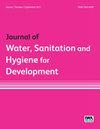‘WaSH Futurism’: exploring post-SDG6 targets using the Nominal Group Technique for more equitable global agenda setting
IF 1.4
4区 环境科学与生态学
Q3 WATER RESOURCES
Journal of Water Sanitation and Hygiene for Development
Pub Date : 2023-08-03
DOI:10.2166/washdev.2023.246
引用次数: 0
Abstract
Sustainable Development Goal 6 (SDG6) is grounded in human rights and derives from international policies refined over decades. We argue that much of this agenda setting and monitoring reflects or gives way to neo-colonialism and neo-liberalism. We implement an online version of the Nominal Group Technique to explore its efficacy for more equitable global agenda setting. We apply the technique to a group of 19 graduate WaSH students – from diverse professional backgrounds and originating from and having worked in all global regions – to gain their insights on future WaSH issues to be included in global targets. This was preceded by preparatory exercises on WaSH progress and influential contextual factors. We thus demonstrate a novel and systematic application of the NGT and discuss its potential to be used in challenging neo-colonial and neo-liberal agenda setting. The results also provide an early assessment of future priorities that could inform post-SDG target setting including: inclusivity among populations and settings, hygiene, menstrual health, sustainability, circular economy, climate resilience, preventing infectious disease transmission, and universal ‘safely managed services’. These are compared with themes highlighted in Joint Monitoring Programme reports, SDG6 indicators and General Comment 15: The Human Right to Water.“WaSH未来主义”:利用名义群体技术探索可持续发展目标6后的目标,以实现更公平的全球议程设置
可持续发展目标6 (SDG6)以人权为基础,源自几十年来不断完善的国际政策。我们认为,这种议程设定和监督在很大程度上反映了新殖民主义和新自由主义,或者让位于它们。我们实施了名义团体技术的在线版本,以探索其对更公平的全球议程设置的功效。我们将该技术应用于一组19名来自不同专业背景、来自全球所有地区并在全球所有地区工作过的讲卫生研究生,以获得他们对未来将纳入全球目标的讲卫生问题的见解。在此之前,进行了关于讲卫生运动进展和有影响的背景因素的筹备工作。因此,我们展示了NGT的一种新颖而系统的应用,并讨论了它在挑战新殖民主义和新自由主义议程设置方面的潜力。研究结果还提供了对未来优先事项的早期评估,可为可持续发展目标后的具体目标设定提供信息,包括:人口和环境之间的包容性、卫生、月经健康、可持续性、循环经济、气候适应能力、预防传染病传播和普遍的“安全管理服务”。将这些与联合监测方案报告、可持续发展目标6指标和第15号一般性意见(水权)中强调的主题进行比较。
本文章由计算机程序翻译,如有差异,请以英文原文为准。
求助全文
约1分钟内获得全文
求助全文
来源期刊

Journal of Water Sanitation and Hygiene for Development
WATER RESOURCES-
CiteScore
3.10
自引率
11.80%
发文量
58
审稿时长
16 weeks
期刊介绍:
The Journal of Water, Sanitation and Hygiene for Development is a peer-reviewed journal devoted to the dissemination of high-quality information on the science, policy and practice of drinking-water supply, sanitation and hygiene at local, national and international levels.
 求助内容:
求助内容: 应助结果提醒方式:
应助结果提醒方式:


